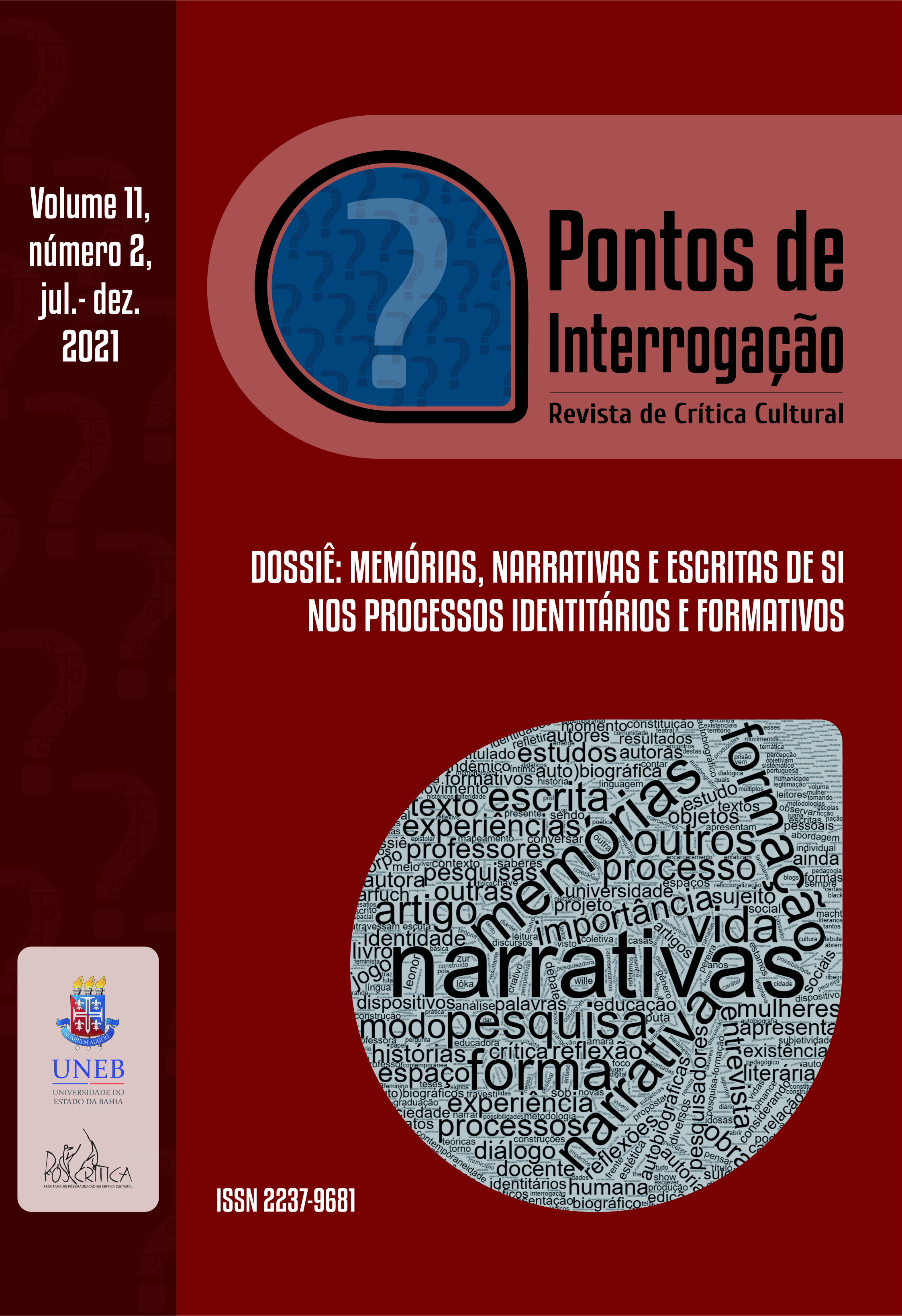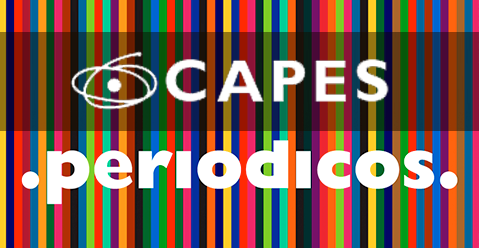Autobiography and human formation
reflecting with Goethe
DOI:
https://doi.org/10.30620/pdi.v11n2.p113Keywords:
Autobiography, Goethe, Human formationAbstract
The aim of the article is to identify processes of human formation in the autobiography of Johann Wolfgang von Goethe (1749-1832) – From my life: poetry and truth – focusing on the analysis of the preface to the work in which the author responds to a letter from friend readers , understood as a text by Goethe himself, and explains the points and counterpoints of his choice for an autobiographical writing to satisfy the demand of his readers. This study, situated in the narrative (auto)biographical paradigm, discusses four dimensions of the autobiography process along the lines of Bildung: as an authorial process; awareness in the intersections with historical contexts, contacts with people near and far, as well as with other authors; explicitation of the multiplicity and metamorphoses of oneself, from a synchronic and diachronic point of view, in the search for an articulation between Poetry (art) and Truth (history) as complementary entities in the existential, intellectual construction of a public man and author of his literary work. The notion of Bildung is fundamental to understanding Goethe's autobiography and his formation novels (Bildungsroman) as the author's proposal on human formation.
[Received on: July 29, 2021 - Accepted on: October 30, 2021]
Downloads
References
AZENHA JUNIOR, João. Goethe e a tradução: a construção da identidade na dinâmica da diferença. Literatura e Sociedade, v. 11, n. 9, p. 44-59, 2006. Disponível em: https://doi.org/10.11606/issn.2237-1184.v0i9p44-59. Acesso em: abr. 2020.
AZEVEDO, Luciene. Autoficção e literatura contemporânea. In: VIOLA, A. F. (Org.) Crítica literária contemporânea. Rio de Janeiro: Civilização Brasileira, 2013. p. 143-163.
BENJAMIN, Walter. Ensaios reunidos sobre Goethe. São Paulo: Editora 34, 2009.
BROWN, Jane K. Goethe’s Allegories of Identity. Philadelphia: University of Pennsylvania Press, 2014.
BRUNER, Jerome. Atos de Significação. Porto Alegre: Artmed, 1997.
BRUNER, Jerome. Fabricando histórias: direito, literatura e vida. São Paulo: Letra e Voz, 2014.
CARPEAUX, Otto Maria. A História concisa da Literatura alemã. S.l.: Faro Editorial, 2013. (Edição do Kindle).
DELORY-MOMBERGER, Christine (Org.). Vocabulaire des histoires de vie et de recherche biographique, Toulouse: Érès, 2019.
DELORY-MOMBERGER, Christine. As histórias de vida: da invenção de si ao projeto de formação. Natal: EDUFRN; Porto Alegre: EDIPUCRS; Brasília: EDUNEB, 2014.
DELORY-MOMBERGER, Christine. Biografia e educação. Natal: EDUFRN; São Paulo: Paulus, 1988.
DILTHEY, Wilhelm. A Construção do Mundo Histórico nas Ciências Sociais. São Paulo: editora da UNESP, 2010.
DILTHEY, Wilhelm. Introdução às Ciências Humanas: tentativa de uma fundamentação para o estudo da sociedade e da história. Rio de Janeiro: Forense Universitária, 2010.
EAKIN, Paul John. Fictions in autobiography: studies in the art of selfinventantion. Pricenton: Princeton University Press, 1988.
ECKERMANN, Johann Peter. Conversações com Goethe nos últimos anos de sua vida 1823-1832. São Paulo: Editora da UNESP, 2016.
GALLE, Helmut. De minha vida: Poesia e verdade – sobre a literalidade da autobiografia de Goethe. Estudos Avançados, v. 33, n. 96, 2019. Disponível em: https://www.revistas.usp.br/eav/article/view/161295. Acesso em: ago. 2020.
GOETHE, Johann Wolfgang von. De Minha Vida: poesia e verdade. São Paulo: editora da UNESP, 2017a.
GOETHE, Johann Wolfgang von. Viagem à Itália. São Paulo: editora da UNESP, 2017b.
GOETHE, Johann Wolfgang von. Fausto. São Paulo: Martin Claret, 2016.
GOETHE, Johann Wolfgang von. Os Anos de Aprendizado de Wilhelm Meister, 2. ed. São Paulo: editora 34, 2009.
GUSDORF, Georges. Condiciones y Limites de la autobiografía. Suplemento Anthropos. n. 29, 1991. Disponível em: https://ayciiunr.files.wordpress.com/2019/08/gusdorf-george-condiciones-ylc3admites-de-la-autobiografc3ada.pdf. Acesso em: jun. 2020.
HEISE, E. Fausto: a busca pelo absoluto. Cult. São Paulo, v. 1, p. 57-60, 2008. Disponível em: https://revistacult.uol.com.br/home/fausto-a-busca-peloabsoluto. Acesso em: 1 jul. 2020.
JAEGER, Michael. Uma confissão em fragmentos: Goethe, Fausto e o peregrino. Estudos Avançados, v. 33, n. 96, p. 277-300, 2019. Disponível em: https://www.revistas.usp.br/eav/article/view/161296. Acesso em: jan. 2021.
KAUFMANN, Walter. Goethe, Kant and Hegel: discovering the mind. New York: Mc Graw Hill, 2002. (vol. 1)
KOSELLECK, Reinhart. Histórias de conceitos: estudos sobre a semântica e a pragmática da linguagem política e social. Trad. Markus Hediger. Rio de Janeiro: Contraponto, 2020. (Edição do Kindle).
LIRA, André Augusto Diniz; PASSEGGI, Maria. Aprendizagens do “tornar-se”, das experiências formadoras e da visibilidade: aproximações entre autobiografias e educação. Educar em revista, v. 37, p. 1-19, 2021. Disponível em: https://www.scielo.br/j/er/a/5VYWN6BvgZcC5FWPgscT8jC/abstract/?lang=pt. Acesso em: ago. 2021.
MAAS, Wilma Patrícia. O Cânone Mínimo: o Bildungsroman na história da literatura. São Paulo: Editora da UNESP, 2000.
MANN, Thomas. Goethe como representante da era burguesa. Rio de Janeiro: Expresso Zahar, 2012. (Edição do Kindle).
MAZZARI, Marcos Vinícius; MARKS, Maria Cecília. (Org.) Romance de Formação: caminhos e descaminhos do herói. Cotia, SP: Ateliê Editorial, 2020.
PASSEGGI, Maria da Conceição. Enfoques narrativos em la investigación educativa brasileña. Revista Paradigma. v. XLI, p. 57-79, jun, 2020. Disponível em: http://revistaparadigma.online/ojs/index.php/paradigma/article/view/929. Acesso em: jun. 2021.
PASSEGGI, Maria da Conceição. Reflexividade narrativa e poder auto(trans)formador. Revista Práxis Educacional. v. 17, n. 44, p. 1-21, jan/mar. 2021. Disponível em: https://redib.org/Record/oai_articulo3061383-reflexividade-narrativa-e-poder-autotransformador. Acesso em: abr. 2021.
PASSEGGI, M. y SOUZA, E. C. (2017). O Movimento (Auto)Biográfico no Brasil: esboço de suas configurações no campo educacional. Investigación Cualitativa, 2(1) p. 6-26. Disponível em: https://www.investigacioncualitativa.com/index.php/revista/article/download/46/27. Acesso em: outubro de 2021.
PINEAU, Gaston; LE GRAND, Jean-Louis. As histórias de vida. Trad. Carlos Braga e Maria Passeggi, Natal:Edufern, 2012.
PIKKARAINEN, Eetu. Signo of Reality – the idea of general Bildung by J. A. Comenius. In: SILJANDER, Pauli. et al. Theories of Bildung and Growth: connections and controversies between continental education and american pragmatism. Rotterdam: Sense Publishers, 2012. p. 19-30.
RICOEUR, Paul. Tempo e Narrativa: o tempo narrado. São Paulo Martins Fontes, 2012.
SILJANDER, Pauli.; SUTINEN, Ari. Introduction. In: SILJANDER, Pauli. et al. Theories of Bildung and Growth: connections and controversies between continental education and american pragmatism. Rotterdam: Sense Publishers, 2012. p. 1-19.
Published
How to Cite
Issue
Section
License
Copyright (c) 2021 Pontos de Interrogação – Journal of Cultural Criticism

This work is licensed under a Creative Commons Attribution-ShareAlike 4.0 International License.
Autores que publicam nesta revista concordam com o seguinte termo de compromisso:
Assumindo a criação original do texto proposto, declaro conceder à Pontos de Interrogação o direito de primeira publicação, licenciando-o sob a Creative Commons Attribution License, e permitindo sua reprodução em indexadores de conteúdo, bibliotecas virtuais e similares. Em contrapartida, disponho de autorização da revista para assumir contratos adicionais para distribuição não-exclusiva da versão do trabalho publicada, bem como permissão para publicar e distribuí-lo em repositórios ou páginas pessoais após o processo editorial, aumentando, com isso, seu impacto e citação.























